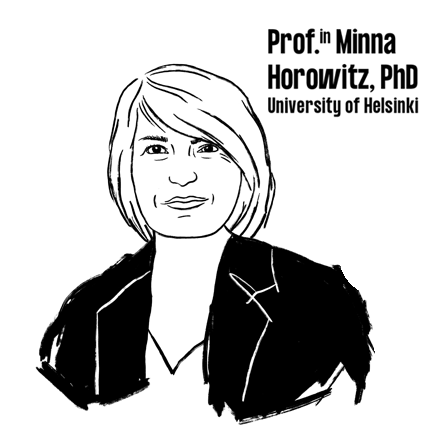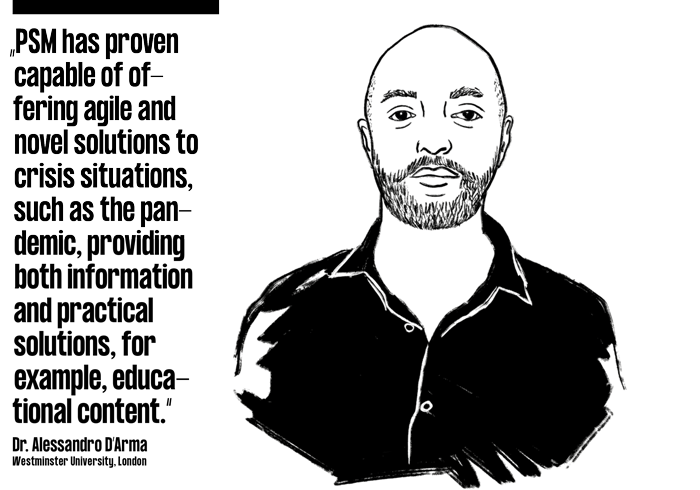Back to overview
Prof.in Minna Horowitz, PhD University of Helsinki & Dr. Alessandro D’Arma, Westminster University, London
The Spring of Hope: Dynamic Public Value

The discussions on the value of PSM to society, or for example the dynamic public value of the BBC, are a part of wider conversations on public organizations, as well as commons, public spaces and new ways to engage in debates, decision-making and problem-solving in societies. As Mariana Mazzucato posits: Only by rethinking public value generation can we move on from debates about whether to fund public institutions to discussions about how to structure and use these institutions to strengthen our social fabric and build a more creative economy.
Interestingly, as knowledge institutions, and public or public-value-oriented, European universities are facing similar dilemmas to PSM, in terms of having to defend their role in society. They, too, will be potentially impacted by post-pandemic economic realities. And, ultimately, they too are in the business of public service: advancing societies through research and education. In many ways, scholars are allies for PSM.

In their recent overview of academic research on PSM, Lestón-Huerta et al. note
that there exists a reasonably rich array of research on the struggles related to digitalization. We know less about lessons learned, or good practices. More research is needed on audiences, as well as PSM organizations with different configurations, beyond the BBC model that seems to be the most revered and researched. If we take the idea seriously that PSM can offer and support national, regional and local solutions to challenges of a global nature, in the chaotic and multifaceted media landscape, then not only PSM organizations but also scholars indeed need to know more about citizens' knowledge needs, as well as learn about new innovative solutions that can come from unusual suspects, both PSM de jure and de facto.
The very purpose of the InnoPSM Network was to investigate and innovate around the role of academic research in supporting the public value of PSM. During the project, it became clear that academic research could open up new vistas focusing on questions of a normative nature: what do we mean by public service and what is the role of PSM in the broader media ecosystem? Scholars could also help in deepening understanding of questions addressing the need to gain a better understanding of the socio-cultural context in which media consumption takes place, including different demographic and psychographic groups beyond crude data. For instance, it was discussed how research collaborations could create more nuanced understandings of "micro generations" within the broad category "young people", and how scholars could contribute to participatory research practices to facilitate co-creation.
Scholars can also support PSM organizations in designing questions relating to potential, alternative public communications systems and non-commercial tools, such as envisioned in the so-called Public Media Stack project.
1 Additionally, as the framework of dynamic public value highlights, there is a need to think of new ways to assess public institutions - and scholars can play an important role in that, not only to create alternatives to much criticized "public value tests", but also to help in monitoring and evaluation of internal projects and processes.

And as professor Graham Murdock emphatically asserted in his talk at an InnoPSM webinar
2, we are at a pivotal moment for revitalizing public service media: We need PSM to support connectivity with initiatives such as public service internet. Similar suggestions have been put forth by the BBC as an internal research and development project.
3 Also, the European Parliament has witnessed related proposals, for instance from two German parties, CDU/CSU and SPD: They have suggested establishment of a European Public Service Platform, built around the collaboration of the platforms of Member States' PSMs, that would foster European identity. The proposal echoes the rationale of the project European Public Open Spaces (EPOS), featured at the first InnoPSM workshop: EPOS seeks to conceptualize the establishment of an Europe-wide participatory platform free from market-driven logic and based on existing PSM activities.
PSM organizations can help to solve wicked problems in the very societies where they exist. While tumultuous times seem to impact the entire globe, they manifest in different ways in different societies - just as the role of PSM differs in different societies, and just as PSM can have dynamic value to specific publics, in specific contexts. We are entering a Spring of Hope. The discussions about, and actions by, PSM organizations at the moment, highlight how important the core premise is: for individual citizens, creative industries, and for any democratic society as a whole.
1https://publicmediastack.com/
2https://innopsm.net/psm-in-challenging-times/
3https://www.bbc.co.uk/rd/projects/public-service-internet
Die Langversion dieses Artikels ist in der Public-Value-Jahresstudie "Die STUDIE: Digitale Transformation" (S. 7-22) erschienen. 


 The discussions on the value of PSM to society, or for example the dynamic public value of the BBC, are a part of wider conversations on public organizations, as well as commons, public spaces and new ways to engage in debates, decision-making and problem-solving in societies. As Mariana Mazzucato posits: Only by rethinking public value generation can we move on from debates about whether to fund public institutions to discussions about how to structure and use these institutions to strengthen our social fabric and build a more creative economy.
The discussions on the value of PSM to society, or for example the dynamic public value of the BBC, are a part of wider conversations on public organizations, as well as commons, public spaces and new ways to engage in debates, decision-making and problem-solving in societies. As Mariana Mazzucato posits: Only by rethinking public value generation can we move on from debates about whether to fund public institutions to discussions about how to structure and use these institutions to strengthen our social fabric and build a more creative economy. In their recent overview of academic research on PSM, Lestón-Huerta et al. note
In their recent overview of academic research on PSM, Lestón-Huerta et al. note
